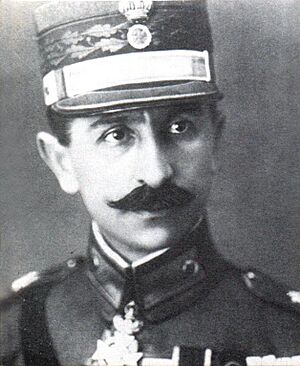Alexandros Othonaios facts for kids
Quick facts for kids
Alexandros Othonaios
|
|
|---|---|
| Αλέξανδρος Οθωναίος | |

Alexandros Othonaios c. early 1920s
|
|
Prime Minister of Greece |
|
| In office 6 – 10 March 1933 |
|
| President | Alexandros Zaimis |
| Preceded by | Eleftherios Venizelos |
| Succeeded by | Panagis Tsaldaris |
| Minister of Military Affairs | |
| In office 6 – 10 March 1933 |
|
| President | Alexandros Zaimis |
| Prime Minister | Himself |
| Preceded by | Georgios Katechakis |
| Succeeded by | Georgios Kondylis |
| Personal details | |
| Born | c. 1879 Gytheio, Kingdom of Greece |
| Died | 20 September 1970 Athens, Greece |
| Alma mater | Hellenic Military Academy |
| Awards | |
| Nicknames | Kapetan Palamidis Καπετάν Παλαμήδης |
| Military service | |
| Allegiance | |
| Branch/service | |
| Years of service | ?-1925 |
| Rank | |
| Commands | Kydoniai Division II Army Corps III Army Corps |
| Battles/wars |
*Soviet Invasion of Ukraine
|
Alexandros Othonaios (Greek: Αλέξανδρος Οθωναίος) was a famous Greek general. He was born in Gytheio around 1879 and passed away in Athens on September 20, 1970. For a short time in 1933, he became the acting Prime Minister of Greece. He led a special government during a failed attempt to take over the government by force, known as a coup d'état.
Contents
Early Life and Military Career
Othonaios was born in Gytheion about 1879. He joined the Hellenic Military Academy to become an army officer.
Fighting for Greece
He took part in the Macedonian Struggle, which was a fight for control of the region of Macedonia. During this time, he used a secret name, Kapetan Palamidis. He was also a member of the Military League, a group of army officers.
Othonaios fought in the Balkan Wars. These were two wars in the Balkan region of Europe. He also supported Eleftherios Venizelos during a big political disagreement in Greece called the National Schism. He commanded the 7th Cretan Regiment during the Macedonian front of World War I.
Later Military Roles
In 1919, Othonaios, who was a colonel, joined the Allied intervention in the Russian Civil War. This was when several countries sent troops to Russia during its civil war.
Later, he became the leader of the Kydoniai Division. He helped occupy the Smyrna area at the start of the Asia Minor Campaign. This was a major conflict between Greece and Turkey.
After Venizelos lost the election in 1920, Othonaios was removed from the army. He went to Constantinople, which was controlled by other countries. There, he joined other officers who supported Venizelos.
Later Career and Political Roles
Othonaios was called back to the army after Greece suffered a big defeat in Asia Minor. This defeat led to a military revolt in September 1922. Colonels Nikolaos Plastiras and Stylianos Gonatas led this revolt.
Important Trials
Othonaios was made the main judge of a special military court. This court put several important leaders who were against Venizelos on trial. This event is known as the "Trial of the Six".
In 1923, he was promoted to Lieutenant General. He commanded the Second and Third Army Corps. However, he resigned from the army in 1925 after General Theodoros Pangalos took power in a coup.
Return to Service
Othonaios returned to the army in 1928. He became the head of the Second Army Inspectorate. From March 6 to 10, 1933, he led a temporary military government. This government was formed to stop an attempted coup by Plastiras.
Othonaios was a strong supporter of Venizelos and a republican (meaning he believed Greece should be a republic, not a monarchy). He was removed from the army again in 1935. This happened after another failed coup attempt by Venizelos supporters.
After this, the monarchy (a system with a king or queen) was brought back to Greece. Later, a strict government, called a conservative dictatorship, was set up by General Ioannis Metaxas.
During this time, and the occupation of Greece by other countries during World War II, Othonaios stayed in Greece. He did not take part in politics.
After Greece was freed in October 1944, he was named commander-in-chief. This was because he was known for his democratic beliefs. But the very tense political situation, which soon led to the Greek Civil War, made him resign permanently in 1945.
 | Selma Burke |
 | Pauline Powell Burns |
 | Frederick J. Brown |
 | Robert Blackburn |

